Mario Draghi, president of the European Central Bank hinted at a change in the direction of monetary policy. This set a sell-off in most major global markets in anticipation of increase in interest rates. A sharp increase in crude oil prices also spooked financial markets.
The decline in oil prices over the last three years has been one of the major drivers of global stock markets. Higher crude oil prices mean higher inflation for the US economy which approached 3% during the first part of 2017. US markets ended lower by 0.2% this week.
Meanwhile, Brazilian markets rose higher this week as shares of state-controlled oil company Petroleo Brasileiro SA rose higher along with crude oil prices. Brazilian markets have been volatile lately owing to uncertainty related to the country’s political crisis. Brazilian president Michel Temer was under a political storm after bribery allegations surfaced against him earlier this year. The Brazilian market closed the week up by 2.7%.
Key World Markets During the Week

Back home, Indian share markets concluded a historic week with the nationwide launch of GST at the stroke of midnight today. Implementation of GST promises to transform India into a single common market and there are many sectors which will gain immensely from this transition. The implementation of the same is bound to bring more companies under the new tax regime, thus providing a level playing field to organized players that face huge competition from the unorganized segment. Although, markets are bound to be turbulent due to short term uncertainty across sectors as the GST is implemented. The Indian stock market ended the week lower by 0.7%.
BSE Indices During the Week

Now let us discuss some key economic and industry developments during the week gone by
The Bharatiya Janata Party (BJP)-led Maharashtra government announced a major farm loan waiver scheme that will see debt of up to Rs 0.15 million per farmer being written off, costing the exchequer Rs 340 billion.
The government has also announced a special package for regular loan payers, by giving them a bonus of Rs 25,000 or 25% of the loan paid, whichever is higher.
As per CM Devendrs Fadnavis, the waiver will add to the state’s financial burden, and this could affect development projects. But as per him the government will tie-up with banks for a staggered loan.
Other than Maharashtra, different state governments have also announced large and small loan waivers for farmers. The Yogi Adityanath government in April had announced a Rs 360 billion farm loan waiver in Uttar Pradesh.
Notably, RBI Governor Urjit Patel had expressed his displeasure at the spate of loan waiver announcements in different states. It would impact credit discipline and incentives for future borrowers to repay. In other words, waivers would engender a moral hazard.
In other news from the economy, just few days before the implementation of GST, Finance Minister Arun Jaitley has said that people may have to face some difficulty initially during the Goods and Services Tax (GST) is rolled out, but in the long run the new indirect tax regime would help cut tax evasion and check price rise. He also said that the GST Council will look at bringing real estate within the GST net by next year and revisit taxing of petroleum products under the new regime in 1-2 years.













Leave A Comment